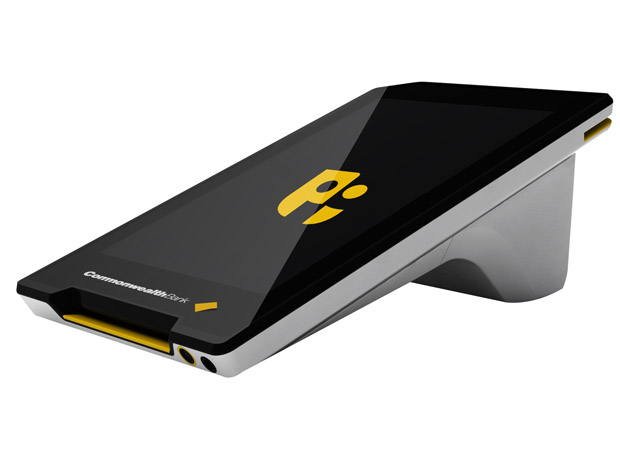CommBank's Pi, Albert and Leo take on retail sales

The Commonwealth Bank of Australia (CBA) has announced its intention to overhaul its point-of-sale transaction system with Pi, and two new devices for iOS and Android, for retailers.

(Credit: CommBank )
Pi is a new software ecosystem designed by CBA. Specifically for retailers, it allows CommBank to offer a number of apps for various transactions or services that customers need in the store. The bank pointed to its Split the Bill app, which will allow customers in a restaurant to sort out individual payments for the bill, without the restaurant having to work out the difference themselves.
In addition to the 10 apps the service will launch within around nine months time, CommBank will also create an "app bank" where Bank-certified developers can add their own apps for retailers.
Pi will launch with a new 7-inch point-of-sale terminal called Albert, which is a touchscreen tablet built by German IT hardware manufacturer Wincor Nixdorf. The tablet runs Android Ice Cream Sandwich, has near-field communications, EMV chip and pin capabilities, 3G and Wi-Fi connectivity, a 1280x800 display, an 8-megapixel camera, 1GB of RAM and 16GB of flash memory. The tablet has been designed to meet PCI-PTS 3.x global security standards.
CommBank's executive general manager of corporate banking solutions Kelly Bayer Rosmarin told journalists in Sydney today that the bank needed to develop its own hardware for the Pi platform because the company couldn't utilise EMV chip technology in existing consumer devices.
Albert can integrate with existing Electronic Cash Register (ECR) systems and be customised for the retailer as required.
Before Albert is sold to retailers, Bayer Rosmarin revealed that, as of next month, CommBank will be launching a shrunken iOS version of Pi for iPhone 4, 4S and iPod Touch, called Leo. The case, developed by Ingenico, fits over the Apple device, like CBA's Kaching case, and allows retailers to conduct transactions using EMV chip, swipe and contactless payment methods.
Leo will come with a Bluetooth printer with which retailers can print receipts for customers via the Pi app, or the receipt can be emailed directly to the customer.
Leo is more suited to retailers who need to be mobile, while Albert is designed for retailers operating in fixed locations, such as restaurants, the bank said.
CBA is keeping quiet at this stage on how much it will cost retailers to equip their stores with the new devices, but Bayer Rosmarin said it wouldn't be compulsory for retailers with CommBank tech to switch over.
"It won't be automatic; we'll work with our customers on a bespoke basis to see together at what point they need to roll it out. Not every customer will want one," she said.
Apps for the Pi platform will not always be free to retailers, Bayer Rosmarin said; CBA is building the App Bank with a payment model included.
"I'm sure there will be a commerce model around it. It won't all be free; app developers will want a return."
There will be a standard set of APIs and a software development kit provided to developers who certify with the bank. The app certification process won't be onerous, according to Bayer Rosmarin, but the bank needs to confirm who is developing for the platform.
"We want to make it open and easy, but we do need to know who is developing apps so we can find them if something goes wrong," she said.
Although the retail sector is struggling in Australia, Bayer Rosmarin said she was confident businesses would see the value in adopting the new Pi platform, because it will bring the "online experience" to retail.
"We think this will help retailers. One of the challenges for retailers is with the whole idea of how you combine the online experience and make it more integrated. We think this will make the whole interaction and experience of going into a store better."
Wincor Nixdorf will begin manufacturing Albert for launch in nine months time, but Bayer Rosmarin said CBA would gauge how many customers wanted the new Android device before determining the number of devices it would manufacture.
"We buy thousands and thousands of terminals every year, so we do have a very good sense about volumes."